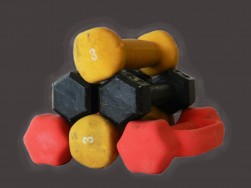
In the past, the majority of people have assumed that testosterone was a “male-only” hormone, but as the use of bio-identical hormones has grown in popularity here in the states and world wide, practitioners and patients alike have come to understand its importance in both men and women.
Testosterone is an anabolic hormone. That simply means it helps “build up” the body. It plays a critical role in the “building up” of bone and muscle. In fact, it is impossible to build muscle in men and women without adequate levels of testosterone.
Testosterone has many other important functions in the human body. For example, it decreases blood clotting, decreases visceral (belly) fat, decreases total cholesterol, improves blood sugar control, improves libido and improves heart health to name a few. Needless to say, healthy testosterone levels are important to good health and longevity in both genders.
Testosterone production begins early in fetal development and continues throughout life. Men produce testosterone in the testicles and in the adrenal glands; women produce it in the adrenals and in the ovaries. As we grow older, testosterone levels have a tendency to drop off (as do most human hormones). The most common symptoms of low testosterone experienced by men and women would include but not be limited to the following: fatigue, muscle weakness, decreased sex drive, bone loss, thinning skin, incontinence and loss of motivation.
As stated earlier, bio-identical testosterone as a part of hormone restoration therapy has become very popular in both men and women over the past few years. Patients have access to bio-identical testosterone through compounding pharmacies and various other products manufactured by the Pharmaceutical industry. Injectable testosterone (not bio-identical) has been used to a great extent for a number of years. In more recent years the use of transdermal or topical testosterone has grown in popularity amongst men and women. Other dosage forms include capsules (least effective), drops and lozenges that dissolve in the mouth or are placed under the tongue and pellets that are implanted into the hip muscle. In the U.S., all forms of testosterone require a prescription.
So, what should you do if you think you might be low in testosterone? You can bring up the subject to your practitioner and see where that leads, or you can call us at Peoples for additional information regarding testing and options.
Symptoms of low testosterone do not always require testosterone therapy. In some cases, correcting nutritional deficiencies and other hormone imbalances like low/high cortisol, low progesterone, low DHEA, etc. will likely improve your symptoms. And last but not least, exercise of any sort is a must when one wants to improve any hormone level, including testosterone.
Please give us a call if we can help with your hormones or health in any way!
by Robert Moore, RPh
